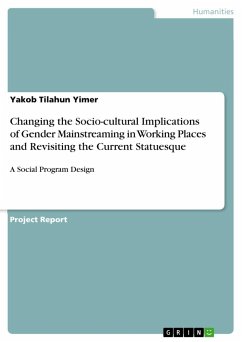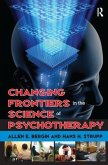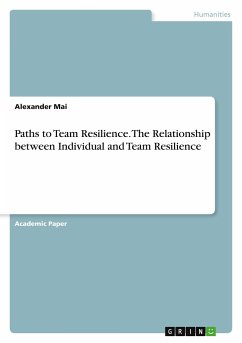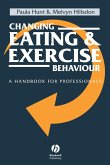Katharina Naswall / Johnny Hellgren / Magnus Sverke (eds.)
The Individual in the Changing Working Life
Herausgeber: Naswall, Katharina; Sverke, Magnus; Hellgren, Johnny
Katharina Naswall / Johnny Hellgren / Magnus Sverke (eds.)
The Individual in the Changing Working Life
Herausgeber: Naswall, Katharina; Sverke, Magnus; Hellgren, Johnny
- Gebundenes Buch
- Merkliste
- Auf die Merkliste
- Bewerten Bewerten
- Teilen
- Produkt teilen
- Produkterinnerung
- Produkterinnerung
Well referenced with global relevance; an important contribution to our understanding of the impact of working life.
Andere Kunden interessierten sich auch für
![Changing the Socio-cultural Implications of Gender Mainstreaming in Working Places and Revisiting the Current Statuesque Changing the Socio-cultural Implications of Gender Mainstreaming in Working Places and Revisiting the Current Statuesque]() Yakob Tilahun YimerChanging the Socio-cultural Implications of Gender Mainstreaming in Working Places and Revisiting the Current Statuesque17,95 €
Yakob Tilahun YimerChanging the Socio-cultural Implications of Gender Mainstreaming in Working Places and Revisiting the Current Statuesque17,95 €![Changing Frontiers in the Science of Psychotherapy Changing Frontiers in the Science of Psychotherapy]() Allen BerginChanging Frontiers in the Science of Psychotherapy190,99 €
Allen BerginChanging Frontiers in the Science of Psychotherapy190,99 €![Working Wonders Working Wonders]() Ryszard PraszkierWorking Wonders77,99 €
Ryszard PraszkierWorking Wonders77,99 €![Working Relationally In and Across Practices Working Relationally In and Across Practices]() Working Relationally In and Across Practices105,99 €
Working Relationally In and Across Practices105,99 €![The Changing Nature of Happiness The Changing Nature of Happiness]() The Changing Nature of Happiness41,99 €
The Changing Nature of Happiness41,99 €![Paths to Team Resilience. The Relationship between Individual and Team Resilience Paths to Team Resilience. The Relationship between Individual and Team Resilience]() Alexander MaiPaths to Team Resilience. The Relationship between Individual and Team Resilience17,95 €
Alexander MaiPaths to Team Resilience. The Relationship between Individual and Team Resilience17,95 €![Changing Eating and Exercise Behaviour Changing Eating and Exercise Behaviour]() Paula HuntChanging Eating and Exercise Behaviour90,99 €
Paula HuntChanging Eating and Exercise Behaviour90,99 €-
-
-
Well referenced with global relevance; an important contribution to our understanding of the impact of working life.
Hinweis: Dieser Artikel kann nur an eine deutsche Lieferadresse ausgeliefert werden.
Hinweis: Dieser Artikel kann nur an eine deutsche Lieferadresse ausgeliefert werden.
Produktdetails
- Produktdetails
- Verlag: Cambridge University Press
- Seitenzahl: 464
- Erscheinungstermin: 2. Juli 2010
- Englisch
- Abmessung: 235mm x 157mm x 32mm
- Gewicht: 899g
- ISBN-13: 9780521879460
- ISBN-10: 0521879469
- Artikelnr.: 23027663
- Herstellerkennzeichnung
- Libri GmbH
- Europaallee 1
- 36244 Bad Hersfeld
- gpsr@libri.de
- Verlag: Cambridge University Press
- Seitenzahl: 464
- Erscheinungstermin: 2. Juli 2010
- Englisch
- Abmessung: 235mm x 157mm x 32mm
- Gewicht: 899g
- ISBN-13: 9780521879460
- ISBN-10: 0521879469
- Artikelnr.: 23027663
- Herstellerkennzeichnung
- Libri GmbH
- Europaallee 1
- 36244 Bad Hersfeld
- gpsr@libri.de
1. The individual in the changing working life: introduction Katharina
Näswall, Johnny Hellgren and Magnus Sverke; Part I. Threats and Challenges:
2. New rules of work: exploring the boundaryless job Michael Allvin; 3.
Changing work roles: new demands and challenges Johnny Hellgren, Magnus
Sverke and Katharina Näswall; 4. The demand-induced strain compensation
model: renewed theoretical considerations and empirical evidence Jan de
Jonge, Christian Dormann and Marieke van den Tooren; 5. Job insecurity and
employability among temporary workers: a theoretical approach based on the
psychological contract Nele De Cuyper and Hans De Witte; 6. Independent
contracting: finding a balance between flexibility and individual
well-being Daniel G. Gallagher; 7. Work-family conflict in individuals'
lives: prevalence, antecedents and outcomes Ulla Kinnunen and Saija Mauno;
8. My love, my life, my everything: work-home interaction among
self-employed Toon W. Taris, Sabine A. E. Geurts, Michiel A. J. Kompier,
Suzanne Lagerveld and Roland W. B. Blonk; 9. Modern work and safety Nik
Chmiel; 10. Romantic relationships at work: old issues, new challenges
Jennifer Carson and Julian Barling; 11. Ethnic diversity at work: an
overview of theories and research Wido G. M. Oerlemans, Maria C. W. Peeters
and Wilmar B. Schaufeli; Part II. Individual Attempts at Restoring the
Balance: 12. Skeleton key or siren song: is coping the answer to balancing
work and well-being? Jaco Pienaar; 13. The dynamic influence of individual
characteristics on employee well-being: a review of the theory, research
and future directions Christopher J. L. Cunningham, Gabriel M. De La Rosa
and Steve M. Jex; 14. Stress and coping at work: new research trends and
their implications for practice José M. Peiró; 15. Work stress, coping and
gender: implications for health and well-being Eva Torkelson and Tuija
Muhonen; 16. The role of protean career attitude during unemployment and
re-employment: a literature review and conceptual model Lea Waters; Part
III. Intervention and Promotion on the Organizational Level: 17.
Participatory action research as work stress intervention Maureen F.
Dollard, Pascale Le Blanc and Sarah J. Cotton; 18. Enhancing work
engagement through the management of human resources Wilmar B. Schaufeli
and Marisa Salanova; 19. Prevention: integrating health protection and
health promotion perspectives Lois E. Tetrick; 20. Workplace interventions
for occupational stress E. Kevin Kelloway, Joseph J. Hurrell, Jr. and Arla
Day.
Näswall, Johnny Hellgren and Magnus Sverke; Part I. Threats and Challenges:
2. New rules of work: exploring the boundaryless job Michael Allvin; 3.
Changing work roles: new demands and challenges Johnny Hellgren, Magnus
Sverke and Katharina Näswall; 4. The demand-induced strain compensation
model: renewed theoretical considerations and empirical evidence Jan de
Jonge, Christian Dormann and Marieke van den Tooren; 5. Job insecurity and
employability among temporary workers: a theoretical approach based on the
psychological contract Nele De Cuyper and Hans De Witte; 6. Independent
contracting: finding a balance between flexibility and individual
well-being Daniel G. Gallagher; 7. Work-family conflict in individuals'
lives: prevalence, antecedents and outcomes Ulla Kinnunen and Saija Mauno;
8. My love, my life, my everything: work-home interaction among
self-employed Toon W. Taris, Sabine A. E. Geurts, Michiel A. J. Kompier,
Suzanne Lagerveld and Roland W. B. Blonk; 9. Modern work and safety Nik
Chmiel; 10. Romantic relationships at work: old issues, new challenges
Jennifer Carson and Julian Barling; 11. Ethnic diversity at work: an
overview of theories and research Wido G. M. Oerlemans, Maria C. W. Peeters
and Wilmar B. Schaufeli; Part II. Individual Attempts at Restoring the
Balance: 12. Skeleton key or siren song: is coping the answer to balancing
work and well-being? Jaco Pienaar; 13. The dynamic influence of individual
characteristics on employee well-being: a review of the theory, research
and future directions Christopher J. L. Cunningham, Gabriel M. De La Rosa
and Steve M. Jex; 14. Stress and coping at work: new research trends and
their implications for practice José M. Peiró; 15. Work stress, coping and
gender: implications for health and well-being Eva Torkelson and Tuija
Muhonen; 16. The role of protean career attitude during unemployment and
re-employment: a literature review and conceptual model Lea Waters; Part
III. Intervention and Promotion on the Organizational Level: 17.
Participatory action research as work stress intervention Maureen F.
Dollard, Pascale Le Blanc and Sarah J. Cotton; 18. Enhancing work
engagement through the management of human resources Wilmar B. Schaufeli
and Marisa Salanova; 19. Prevention: integrating health protection and
health promotion perspectives Lois E. Tetrick; 20. Workplace interventions
for occupational stress E. Kevin Kelloway, Joseph J. Hurrell, Jr. and Arla
Day.
1. The individual in the changing working life: introduction Katharina
Näswall, Johnny Hellgren and Magnus Sverke; Part I. Threats and Challenges:
2. New rules of work: exploring the boundaryless job Michael Allvin; 3.
Changing work roles: new demands and challenges Johnny Hellgren, Magnus
Sverke and Katharina Näswall; 4. The demand-induced strain compensation
model: renewed theoretical considerations and empirical evidence Jan de
Jonge, Christian Dormann and Marieke van den Tooren; 5. Job insecurity and
employability among temporary workers: a theoretical approach based on the
psychological contract Nele De Cuyper and Hans De Witte; 6. Independent
contracting: finding a balance between flexibility and individual
well-being Daniel G. Gallagher; 7. Work-family conflict in individuals'
lives: prevalence, antecedents and outcomes Ulla Kinnunen and Saija Mauno;
8. My love, my life, my everything: work-home interaction among
self-employed Toon W. Taris, Sabine A. E. Geurts, Michiel A. J. Kompier,
Suzanne Lagerveld and Roland W. B. Blonk; 9. Modern work and safety Nik
Chmiel; 10. Romantic relationships at work: old issues, new challenges
Jennifer Carson and Julian Barling; 11. Ethnic diversity at work: an
overview of theories and research Wido G. M. Oerlemans, Maria C. W. Peeters
and Wilmar B. Schaufeli; Part II. Individual Attempts at Restoring the
Balance: 12. Skeleton key or siren song: is coping the answer to balancing
work and well-being? Jaco Pienaar; 13. The dynamic influence of individual
characteristics on employee well-being: a review of the theory, research
and future directions Christopher J. L. Cunningham, Gabriel M. De La Rosa
and Steve M. Jex; 14. Stress and coping at work: new research trends and
their implications for practice José M. Peiró; 15. Work stress, coping and
gender: implications for health and well-being Eva Torkelson and Tuija
Muhonen; 16. The role of protean career attitude during unemployment and
re-employment: a literature review and conceptual model Lea Waters; Part
III. Intervention and Promotion on the Organizational Level: 17.
Participatory action research as work stress intervention Maureen F.
Dollard, Pascale Le Blanc and Sarah J. Cotton; 18. Enhancing work
engagement through the management of human resources Wilmar B. Schaufeli
and Marisa Salanova; 19. Prevention: integrating health protection and
health promotion perspectives Lois E. Tetrick; 20. Workplace interventions
for occupational stress E. Kevin Kelloway, Joseph J. Hurrell, Jr. and Arla
Day.
Näswall, Johnny Hellgren and Magnus Sverke; Part I. Threats and Challenges:
2. New rules of work: exploring the boundaryless job Michael Allvin; 3.
Changing work roles: new demands and challenges Johnny Hellgren, Magnus
Sverke and Katharina Näswall; 4. The demand-induced strain compensation
model: renewed theoretical considerations and empirical evidence Jan de
Jonge, Christian Dormann and Marieke van den Tooren; 5. Job insecurity and
employability among temporary workers: a theoretical approach based on the
psychological contract Nele De Cuyper and Hans De Witte; 6. Independent
contracting: finding a balance between flexibility and individual
well-being Daniel G. Gallagher; 7. Work-family conflict in individuals'
lives: prevalence, antecedents and outcomes Ulla Kinnunen and Saija Mauno;
8. My love, my life, my everything: work-home interaction among
self-employed Toon W. Taris, Sabine A. E. Geurts, Michiel A. J. Kompier,
Suzanne Lagerveld and Roland W. B. Blonk; 9. Modern work and safety Nik
Chmiel; 10. Romantic relationships at work: old issues, new challenges
Jennifer Carson and Julian Barling; 11. Ethnic diversity at work: an
overview of theories and research Wido G. M. Oerlemans, Maria C. W. Peeters
and Wilmar B. Schaufeli; Part II. Individual Attempts at Restoring the
Balance: 12. Skeleton key or siren song: is coping the answer to balancing
work and well-being? Jaco Pienaar; 13. The dynamic influence of individual
characteristics on employee well-being: a review of the theory, research
and future directions Christopher J. L. Cunningham, Gabriel M. De La Rosa
and Steve M. Jex; 14. Stress and coping at work: new research trends and
their implications for practice José M. Peiró; 15. Work stress, coping and
gender: implications for health and well-being Eva Torkelson and Tuija
Muhonen; 16. The role of protean career attitude during unemployment and
re-employment: a literature review and conceptual model Lea Waters; Part
III. Intervention and Promotion on the Organizational Level: 17.
Participatory action research as work stress intervention Maureen F.
Dollard, Pascale Le Blanc and Sarah J. Cotton; 18. Enhancing work
engagement through the management of human resources Wilmar B. Schaufeli
and Marisa Salanova; 19. Prevention: integrating health protection and
health promotion perspectives Lois E. Tetrick; 20. Workplace interventions
for occupational stress E. Kevin Kelloway, Joseph J. Hurrell, Jr. and Arla
Day.








